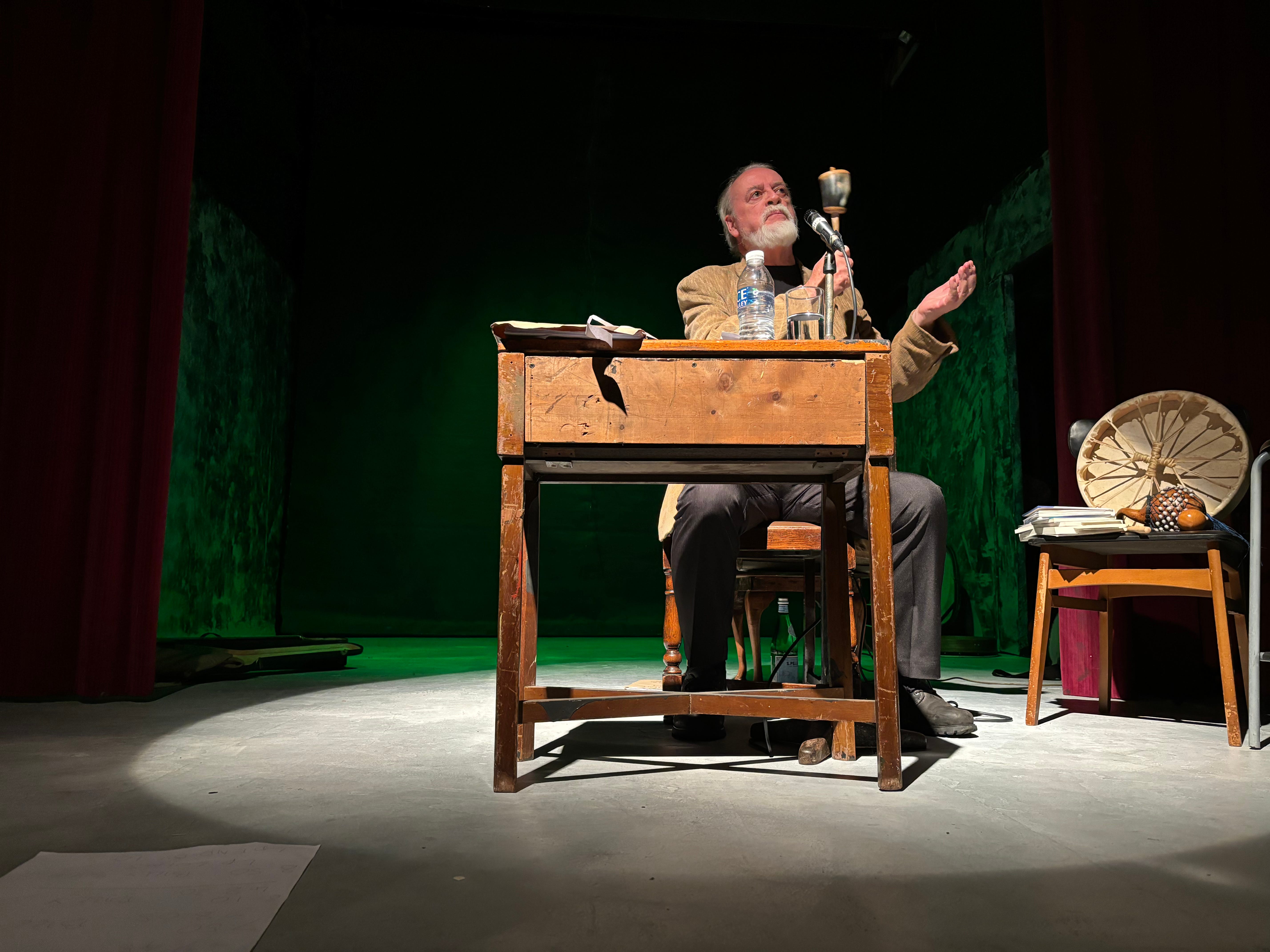An evening of Medway Poetry and Song
A review of Billy Childish, The Singing Loins, and more at the Medway Little Theatre by music critic Stephen Morris
It’s Saturday 4 November. For the second night running, something of the spirit of Chris Broderick has descended upon a Kentish stage. Last night, Tenterden played host to a performance of the late singer and writer’s song cycle, And One Red Mitten, themed around the life – not death – of Catherine Eddowes, a victim of the Whitechapel Murders.
Tonight though, the Medway Little Theatre is the venue for a performance by The Singing Loins, Chris Broderick’s old band, with Billy Childish, an old friend of the lead vocalist, taking centre stage on singing duties.
But we’re getting a little ahead of ourselves.
Before we get to the music, there is poetry. Bill Lewis and Billy Childish, founding members of The Medway Poets, are joined by Wolf Howard, more often to be found on stage behind a drumkit than reading verse into a microphone, to read selections of their poems.
Wolf Howard is the first to take to the Little Theatre’s little stage, sitting at a small wooden desk, the kind readers of a certain age might remember from their school days. There is something of the schoolboy about elements of Howard’s reading too: it opens with a poem that fantasises about childhood confectionary one minute and blowjobs from strangers the next.
Shortly afterwards there is a gleefully violent portrayal of all the kind of grievous bodily harm the poet would inflict upon his errant, uncooperative computer if it was a human being. ‘And don’t get me started on printers,’ he mutters as the appreciative ripple of applause fades away.
It is a mix of the twin themes of immaturity and violence that come to define much of Howard’s readings: a poem about the delight witnessed on his sibling’s face when “I called my brother a cunt”; the jarring description of a schoolboy’s meticulous mutilation of a crane fly.
Elsewhere, there’s a brutal description of Howard’s own experience as an artist. “I try to bludgeon a painting into shape,” he confesses in ‘In my Studio’). And in those eight words we get an immediate sense of creative exasperation: a portrait of the artist as a vexed man.
At other times, and in other media, the aggressive use of the paintbrush makes way for the compulsive purchasing of typewriters, with a story familiar to anyone of a creative bent: how our procrastinating hero will seek to buy shiny new things in the misguided belief that shiny new things will defeat writer’s block once and for all.
They rarely do.
There is an almost juvenile wit in much of Wolf Howard’s poetry: the nonagenarian couple waiting for their kids to die before they get divorced (‘In the Paper’); the teasing of a wife that her husband’s ears are both too high and too low because they’re so big (‘In the Spring of Love’).
But there is one poem that defies such a label because it is shorn of all humour and adolescent playfulness. In place of these Howard staples, ‘Hard Working Families’ is filled with contempt and bitter rage, directed at politicians who “piss and shit on you from a great height”, claiming to be standing up for “hard working families”, but all the while encouraging their voters to “hate the people like you” – the “people in the same boat”.
It is this stark alignment of polar opposites: of innocence with seedy experience, of sixth form smirks with righteous anger, that makes this selection of Wolf Howard’s readings such a delight for the Little Theatre’s audience.
By way of contrast with these stark contrasts, Bill Lewis’s selection of poetry considers a wider world of Nicaraguan revolutionaries, of transexuals (“handcuffed to her birth certificate”) bound for surgery in Morocco. Lewis opens his reading with a song: ‘Shaman’s Song’ in which he poses metaphysical questions against the rhythmic pulse of an egg shaker: “Is this a dream I’m dreaming/or am I only dreaming I am in a dream…Is this a song I’m singing/or am I just a song that is being sung?”.
Beyond such existential considerations, the theme that emerges from Lewis’s reading is the disparity between what is and what should be. At his most trivial he has fun with the idea of three bears living in the suburbs, troubled by the appearance in their home of a passed-out post-coital blonde and, more concerningly, a piece of art by Pablo Picasso; at his most serious, he mourns the activities of “the coyote” in kleptocracies – white imperialists maintaining a stranglehold on developing economies, forever thirsty for bribes.
Nowhere is this theme of difference between the desirable and the actual more clearly pronounced than in a single observation that “the only mariachis are orchestras of skeletons”. It’s a sombre, heartbreaking line, as vivid as it is terrible in its resonance.
At the heart of these poems, beneath all of the philosophical musings and the eloquent descriptions of life in exotic locales, Lewis’ question is as simple as it is old as it is profound: Why? Why must things be as they are? Why do we make things so difficult for ourselves? Why do we make things so unbearably painful for others?
At the close of his readings, Lewis addresses the audience to introduce the next performer: “Poet, painting, musician, fucking legend”.
He is, of course, talking about Billy Childish.
Keep reading with a 7-day free trial
Subscribe to Local Authority to keep reading this post and get 7 days of free access to the full post archives.




